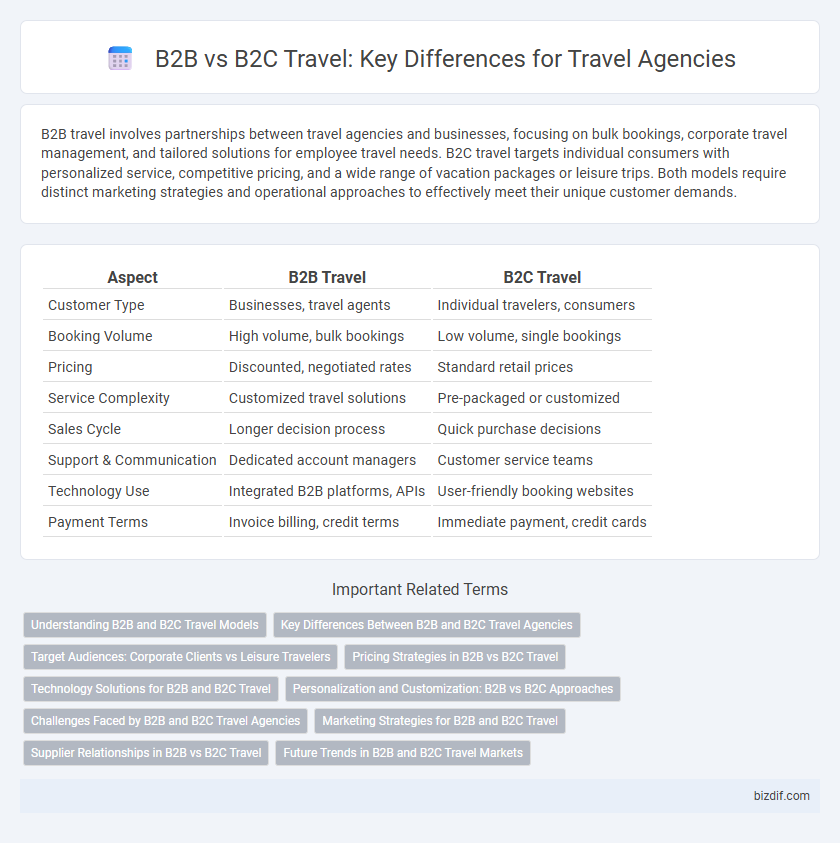B2B travel involves partnerships between travel agencies and businesses, focusing on bulk bookings, corporate travel management, and tailored solutions for employee travel needs. B2C travel targets individual consumers with personalized service, competitive pricing, and a wide range of vacation packages or leisure trips. Both models require distinct marketing strategies and operational approaches to effectively meet their unique customer demands.
Table of Comparison
| Aspect | B2B Travel | B2C Travel |
|---|---|---|
| Customer Type | Businesses, travel agents | Individual travelers, consumers |
| Booking Volume | High volume, bulk bookings | Low volume, single bookings |
| Pricing | Discounted, negotiated rates | Standard retail prices |
| Service Complexity | Customized travel solutions | Pre-packaged or customized |
| Sales Cycle | Longer decision process | Quick purchase decisions |
| Support & Communication | Dedicated account managers | Customer service teams |
| Technology Use | Integrated B2B platforms, APIs | User-friendly booking websites |
| Payment Terms | Invoice billing, credit terms | Immediate payment, credit cards |
Understanding B2B and B2C Travel Models
B2B travel models involve partnerships between travel agencies and other businesses such as hotels, airlines, and corporate clients, emphasizing bulk bookings, negotiated rates, and customized service packages. In contrast, B2C travel targets individual travelers, focusing on personalized experiences, direct bookings, and user-friendly online platforms. Understanding the key differences in customer behavior, sales cycles, and service requirements is essential for travel agencies to effectively tailor their marketing strategies and operational processes.
Key Differences Between B2B and B2C Travel Agencies
B2B travel agencies focus on providing tailored solutions to corporate clients, offering bulk bookings and negotiated rates for frequent business travelers, while B2C travel agencies cater directly to individual consumers seeking personalized vacation packages and leisure travel options. B2B operations emphasize long-term contracts, streamlined communication, and scalability to meet corporate travel policies, whereas B2C agencies prioritize customer experience, instant booking, and diverse destination offerings. Revenue models differ as B2B agencies rely on commission-based contracts and service fees with businesses, whereas B2C agencies generate income primarily through direct consumer sales and upselling ancillary services.
Target Audiences: Corporate Clients vs Leisure Travelers
B2B travel primarily targets corporate clients seeking customized business travel solutions, streamlined booking processes, and expense management tools to enhance productivity and compliance. In contrast, B2C travel focuses on leisure travelers looking for personalized vacation packages, competitive pricing, and memorable experiences. Understanding these distinct target audiences allows travel agencies to tailor services and marketing strategies for optimized customer engagement and satisfaction.
Pricing Strategies in B2B vs B2C Travel
B2B travel pricing strategies often involve negotiated rates, volume discounts, and flexible terms tailored to corporate clients' specific needs, ensuring competitive advantages for large-scale bookings. In contrast, B2C travel pricing emphasizes dynamic pricing models based on demand, seasonal trends, and customer personalization to attract individual travelers with transparent and fixed costs. Understanding these distinct approaches enables travel agencies to optimize revenue streams while catering to the unique expectations of business and consumer markets.
Technology Solutions for B2B and B2C Travel
Technology solutions for B2B travel focus on integrated booking platforms, API connectivity, and automated procurement systems to streamline workflows for corporate clients and travel agents. In contrast, B2C travel technology emphasizes user-friendly interfaces, personalized recommendations, and mobile app integrations to enhance individual customer experiences. Both sectors leverage data analytics and AI, but B2B solutions prioritize scalability and security, while B2C targets engagement and convenience.
Personalization and Customization: B2B vs B2C Approaches
B2B travel emphasizes personalized solutions tailored to corporate clients' complex needs, including customized itineraries, negotiated rates, and integrated reporting tools that enhance efficiency and cost control. In contrast, B2C travel prioritizes individual preferences by offering flexible booking options, personalized recommendations based on user behavior, and customizable packages that cater to leisure travelers' unique desires. Both approaches leverage data analytics but B2B customization centers on scalability and compliance, while B2C focuses on engaging user experiences and personal convenience.
Challenges Faced by B2B and B2C Travel Agencies
B2B travel agencies face challenges such as managing complex client relationships, negotiating competitive rates with suppliers, and maintaining efficient booking systems tailored for corporate clients. B2C travel agencies encounter high competition in the consumer market, fluctuating customer preferences, and the need for personalized marketing to attract individual travelers. Both models struggle with adapting to rapid technological advancements and ensuring seamless customer experiences across multiple platforms.
Marketing Strategies for B2B and B2C Travel
B2B travel marketing strategies emphasize building long-term partnerships, leveraging relationship marketing, and using targeted content that addresses corporate needs and industry-specific pain points. B2C travel marketing focuses on emotional engagement through visually appealing campaigns, personalized offers, and social media influencer collaborations to attract leisure travelers. Data-driven segmentation and customer journey mapping are critical in both B2B and B2C approaches to optimize conversion rates and customer retention.
Supplier Relationships in B2B vs B2C Travel
B2B travel agencies cultivate direct, long-term relationships with suppliers such as airlines, hotels, and car rental companies, often negotiating exclusive rates and bulk deals that are not available to individual consumers. In contrast, B2C travel models rely on broader, transactional interactions with suppliers, focusing on volume and convenience rather than personalized agreements. Strong supplier partnerships in B2B travel enable agencies to offer tailored packages, increased flexibility, and competitive pricing that enhance value for corporate clients.
Future Trends in B2B and B2C Travel Markets
B2B travel is rapidly evolving with digital platforms enhancing personalized service and streamlined booking processes, driving efficiency in corporate travel management. B2C travel is increasingly influenced by AI-driven customization, immersive virtual experiences, and sustainable travel preferences, catering to individual consumer demands. Integration of data analytics and mobile technology in both markets promises to optimize customer experience and operational agility in the future travel landscape.
B2B travel vs B2C travel Infographic

 bizdif.com
bizdif.com